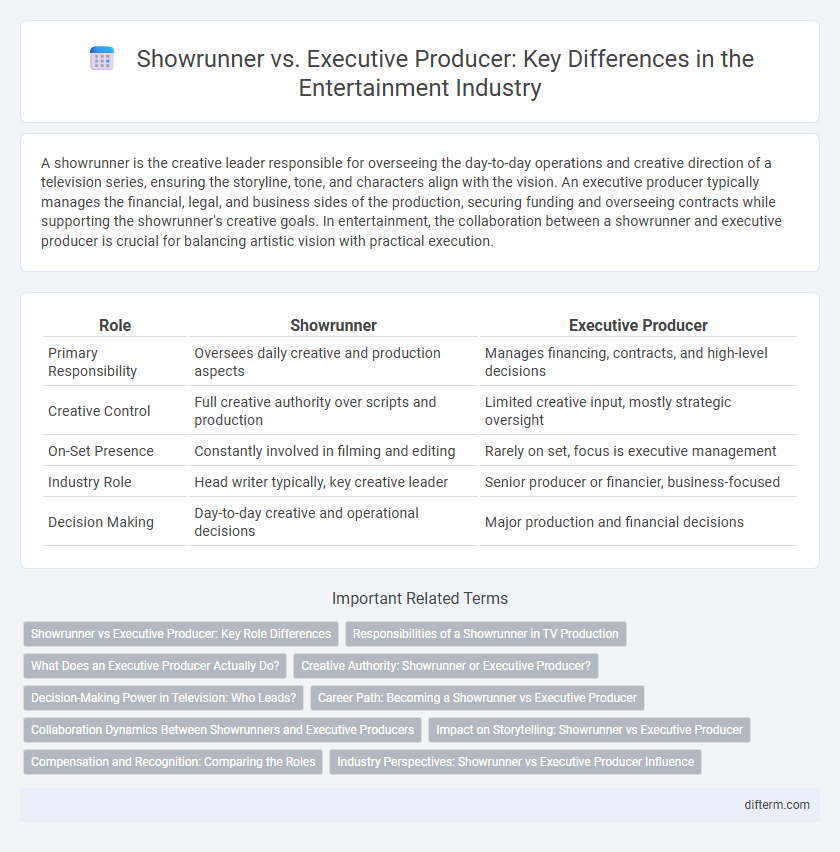A showrunner is the creative leader responsible for overseeing the day-to-day operations and creative direction of a television series, ensuring the storyline, tone, and characters align with the vision. An executive producer typically manages the financial, legal, and business sides of the production, securing funding and overseeing contracts while supporting the showrunner's creative goals. In entertainment, the collaboration between a showrunner and executive producer is crucial for balancing artistic vision with practical execution.
Table of Comparison
| Role | Showrunner | Executive Producer |
|---|---|---|
| Primary Responsibility | Oversees daily creative and production aspects | Manages financing, contracts, and high-level decisions |
| Creative Control | Full creative authority over scripts and production | Limited creative input, mostly strategic oversight |
| On-Set Presence | Constantly involved in filming and editing | Rarely on set, focus is executive management |
| Industry Role | Head writer typically, key creative leader | Senior producer or financier, business-focused |
| Decision Making | Day-to-day creative and operational decisions | Major production and financial decisions |
Showrunner vs Executive Producer: Key Role Differences
Showrunners oversee the creative vision and daily production of a television series, ensuring script development, casting, and shooting align with the intended narrative. Executive producers primarily manage financial aspects, secure funding, and handle high-level decision-making, often with less involvement in creative details. Understanding these role distinctions clarifies how showrunners drive storytelling while executive producers ensure resource allocation and project viability.
Responsibilities of a Showrunner in TV Production
A showrunner oversees the entire creative vision and day-to-day operations of a TV series, managing script development, casting decisions, and production schedules to ensure cohesive storytelling. They coordinate between writers, directors, and network executives, maintaining the show's tone and quality throughout the season. Unlike executive producers who may focus on financing and high-level decisions, showrunners handle hands-on creative leadership and on-set problem-solving.
What Does an Executive Producer Actually Do?
An Executive Producer oversees the financial and business aspects of a production, securing funding, managing budgets, and ensuring the project stays on schedule. They serve as the primary liaison between the production company, network, and creative teams, often making high-level decisions but with less involvement in day-to-day creative details compared to the showrunner. Their role is crucial for maintaining the overall vision and commercial viability of the show.
Creative Authority: Showrunner or Executive Producer?
The showrunner holds primary creative authority on a television series, overseeing story development, script approval, and day-to-day production decisions to maintain the show's vision. Executive producers often provide financing, strategic guidance, and high-level oversight but typically lack direct involvement in the show's creative details. The showrunner's role is central to shaping the narrative, tone, and characters, solidifying their position as the creative leader on set.
Decision-Making Power in Television: Who Leads?
Showrunners possess primary decision-making power in television production, overseeing both the creative vision and day-to-day operations of a series. Executive producers typically focus on financial and administrative aspects, providing high-level oversight without direct control over script and production details. The showrunner's role is crucial for maintaining the narrative consistency and overall tone, marking them as the true creative leader on set.
Career Path: Becoming a Showrunner vs Executive Producer
Becoming a showrunner typically involves years of experience as a writer and producer, mastering storytelling, team leadership, and creative decision-making in television. Executive producers often have diverse backgrounds, including financiers, studio executives, or creatives who transition into overseeing production budgets, marketing, and business aspects of a show. Career paths diverge as showrunners focus on narrative and show management, while executive producers prioritize financial and operational leadership within the entertainment industry.
Collaboration Dynamics Between Showrunners and Executive Producers
Showrunners and executive producers collaborate closely to balance creative vision with production logistics, ensuring a cohesive storytelling experience. The showrunner primarily drives the narrative direction and script supervision while executive producers focus on financing, budgeting, and high-level decision-making. Their dynamic partnership is crucial for aligning artistic goals with operational constraints, fostering both innovation and efficiency in television production.
Impact on Storytelling: Showrunner vs Executive Producer
Showrunners directly shape the narrative by overseeing the writing, pacing, and character development to ensure cohesive storytelling throughout a series. Executive producers focus on the broader production aspects, managing budgets and logistics, which indirectly influence the creative process. The showrunner's hands-on role results in a more consistent and unified storyline, while executive producers maintain overall project feasibility and strategic direction.
Compensation and Recognition: Comparing the Roles
Showrunners typically receive higher compensation than executive producers due to their comprehensive control over a show's creative and production processes, often entitling them to bonuses and profit participation. Executive producers, while influential, generally earn less and focus more on financing, business decisions, or high-level oversight rather than day-to-day creative control. Recognition aligns similarly, with showrunners credited as the primary creative visionaries, gaining more public and industry acknowledgment compared to the broader, sometimes more anonymous role of executive producers.
Industry Perspectives: Showrunner vs Executive Producer Influence
Showrunners hold primary creative authority, overseeing script development, casting, and daily production decisions, effectively shaping the show's vision and tone. Executive producers typically manage financing, distribution, and high-level business aspects, influencing strategic directions rather than granular creative details. Industry perspectives emphasize that while executive producers ensure commercial viability, showrunners drive narrative cohesion and artistic integrity within television production.
showrunner vs executive producer Infographic

 difterm.com
difterm.com